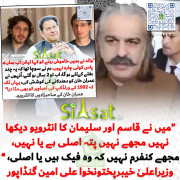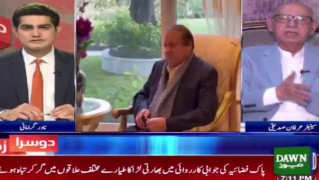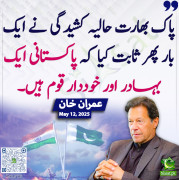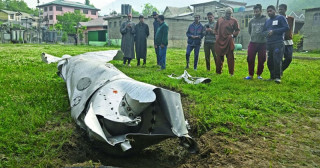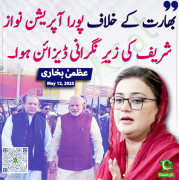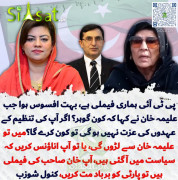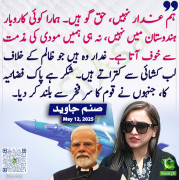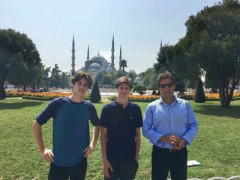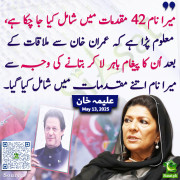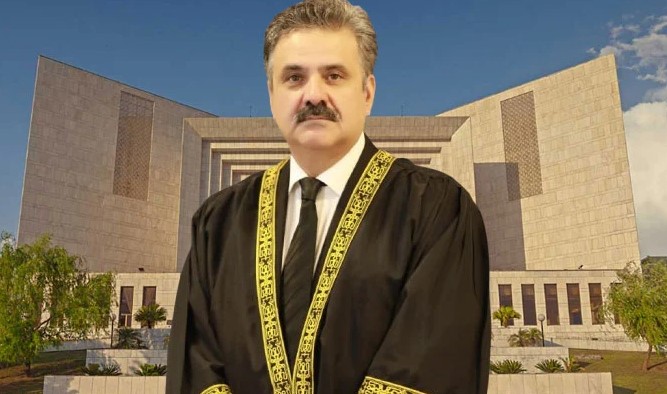C
commander
Guest
Himalayan Blunder (Sino-Indian War of 1962)
http://www.thenews.com.pk/daily_detail.asp?id=197002
Sunday, September 06, 2009
A banker by profession, Salim Ansar has a passion for history and historic books. His personal library already boasts a treasure trove of over 7,000 rare and unique books.
Every week, we shall take a leaf from one such book and treat you to a little taste of history.
BOOK NAME: Himalayan Blunder (Sino-Indian War of 1962)
AUTHOR: Brig. J. P. Dalvi
PUBLISHER: Thacker & Company Ltd - Bombay
DATE OF PUBLICATION: 1969
The following excerpt has been taken from Page: 1-4
Brigadier John Dalvis account not only of the disastrous thirty days conflict but of the policies and attitudes of mind which led to it, as also of the lessons to be drawn from that tragic confrontation gives this book an unusual dimension. The author had the advantage of being a participant in the fighting when on the morning of 20th October 1962 massed Chinese artillery opened up a heavy concentration on the weak Indian garrison in a narrow sector of the Namka Chu valley of Kameng Frontier Division in the North-East Frontier Agency (NEFA). Dalvi was taken prisoner and held in captivity for seven months during which as he writes poignantly, a wave of bitter shame for this country overwhelmed him.
This book is partly the result of those seven months of brooding and thinking. It is remarkable not only for its sensitive writing but for its thinking in depth. No soldier who passed through that searing experience, however generous his nature, could be impervious to a deep embitterment of spirit and feeling. It is to Dalvis credit that he does not allow this embitterment to cloud his judgement and thought.
EXTRACT
On the night of 21st November 1962, I was woken by the Chinese Major in charge of my solitary confinement with shouts of good news-good news. He told me that the Sino-Indian War was over and the Chinese Government had decided to withdraw from all the areas which they had overrun, in their lightning campaign. When I asked the reason for this decision he gave me this Peking inspired answer: India and China have been friends for thousands of years and have never fought before. China does not want war. It is the reactionary (sic) Indian Government that was bent on war. So the Chinese counter-attacked in self-defence and liberated all our territories in NEFA and Ladakh, in just one month. Now we have decided to go back as we do not want to settle the border problem by force. We have proved that you are no match for mighty China. He concluded with this supercilious and patronising remark: We hope that the Indian Government will now see sense and come to the conference table at once so that 1,200 million Chinese and Indians can get on with their national development plans and halt Western Imperialism.
This kindergarten homily was, and remains, the most humiliating moment of my 7-month captivity and indeed of my life. That night I experienced a wave of bitter shame for my country. In my grief I took a solemn vow that one day I would tell the truth about how we let ourselves reach such a sorry pass. With time heavy on my hands, as I had no radio, newspapers or books, I brooded over Indias humiliation and the fate of my command.
I was repatriated, along with all the other officers of field rank, on 4th May 1963. We reached Barrack-pore, the Military Airport at Calcutta at mid-day but could not land there and were diverted to Dum Dum.
We deplaned and were greeted with correct military protocol, tinged with a chill reserve. It was only later that I found out that we had to clear ourselves of the charge of having been brainwashed - a strange charge from a Government which had itself been brain washed into championing Chinas cause for more than a decade.
Without a doubt the prisoners had been declared outcasts. Apparently we should have atoned for the past national sins of omission and commission with our lives. Our repatriation was embarrassing as the national spotlight had again been focused on the Sino-Indian Conflict.
From the tarmac we were herded straight to the Customs enclosure where a sprightly team of appraisers! had assembled to examine our luggage. They had been told that some Indians had arrived from Hong Kong and were waiting to confiscate transistors and opium! I knew then that there had been no material change in India and we were in the same old groove.
After a cursory and stereotyped de-briefing at Ranchi, I was ordered to meet the Chief of Army Staff, Gen. J. N. Chaudhuri at Delhi on 15th May. He asked me to write a report for the personal information of the Defence Minister and himself. The aim was, in Gen. Chaudhuris words: To teach ourselves how not to hand over a brigade on a plate to the Chinese in future. He added that we had become the laughing stock of even countries like ... and ... (I hesitate to name these countries!).
I welcomed the opportunity afforded by the Chiefs instruction for a personal report as this would give me a chance to collect my thoughts. The basic facts had been branded into my memory. To make doubly sure, I had many sessions with Lt. Col. Rikh, Commanding Officer of 2 Rajputs and Lt. Col. B. S. Ahluwalia, Commanding Officer of the 1/9 Gorkhas, Major R. O. Kharbanda and Captain T. K. Gupta of my Staff. We recounted, cross-checked and authenticated the facts which form the basis for this book. Rankling at our unfriendly reception and the many garbled versions I heard from friends, I wrote a forthright account which I handed over to the Chief personally. I do not know the fate of this report as I was never again asked to discuss or explain it. It may have touched some sensitive nerves.
It was soon apparent that the Army had become the centre of much controversy and that the blame for the 1962 fiasco had been cunningly shifted to its alleged shortcomings. What was more alarming were the extravagant claims made by some senior Army Officers, who attained eminence only after the 1962 reshuffles, as to how brilliantly they would have handled the situation and defied the authority of Nehru, Menon and Kaul. This attitude made me despair of whether my countrymen and colleagues would ever learn any lessons from Indias first attempt at conducting a modern war and strengthened my resolution to tell my story.
1962 was a National Failure of which every Indian is guilty. It was a failure in the Higher Direction of War, a failure of the Opposition, a failure of the General Staff (myself included); it was a failure of Responsible Public Opinion and the Press. For the Government of India, it was a Himalayan Blunder at all levels.
There are others, mostly barren politicians, who use the Nehru legend to buttress their failures, or inveterate hero-worshippers, who express irritation at any adverse reference to Mr. Nehrus long spell as the Prime Minister of India. As was said of Lord Chatham, the British Prime Minister, His country men were so conscious of what they owed him that they did not want to hear about his faults. But it is impossible to narrate a failure, which historically marked the end of the Nehru saga, without critical, often harsh comments on the principle dramatis personae who held high office and who were revered by the people."
[email protected]
http://www.thenews.com.pk/daily_detail.asp?id=197002
Sunday, September 06, 2009
A banker by profession, Salim Ansar has a passion for history and historic books. His personal library already boasts a treasure trove of over 7,000 rare and unique books.
Every week, we shall take a leaf from one such book and treat you to a little taste of history.
BOOK NAME: Himalayan Blunder (Sino-Indian War of 1962)
AUTHOR: Brig. J. P. Dalvi
PUBLISHER: Thacker & Company Ltd - Bombay
DATE OF PUBLICATION: 1969
The following excerpt has been taken from Page: 1-4
Brigadier John Dalvis account not only of the disastrous thirty days conflict but of the policies and attitudes of mind which led to it, as also of the lessons to be drawn from that tragic confrontation gives this book an unusual dimension. The author had the advantage of being a participant in the fighting when on the morning of 20th October 1962 massed Chinese artillery opened up a heavy concentration on the weak Indian garrison in a narrow sector of the Namka Chu valley of Kameng Frontier Division in the North-East Frontier Agency (NEFA). Dalvi was taken prisoner and held in captivity for seven months during which as he writes poignantly, a wave of bitter shame for this country overwhelmed him.
This book is partly the result of those seven months of brooding and thinking. It is remarkable not only for its sensitive writing but for its thinking in depth. No soldier who passed through that searing experience, however generous his nature, could be impervious to a deep embitterment of spirit and feeling. It is to Dalvis credit that he does not allow this embitterment to cloud his judgement and thought.
EXTRACT
On the night of 21st November 1962, I was woken by the Chinese Major in charge of my solitary confinement with shouts of good news-good news. He told me that the Sino-Indian War was over and the Chinese Government had decided to withdraw from all the areas which they had overrun, in their lightning campaign. When I asked the reason for this decision he gave me this Peking inspired answer: India and China have been friends for thousands of years and have never fought before. China does not want war. It is the reactionary (sic) Indian Government that was bent on war. So the Chinese counter-attacked in self-defence and liberated all our territories in NEFA and Ladakh, in just one month. Now we have decided to go back as we do not want to settle the border problem by force. We have proved that you are no match for mighty China. He concluded with this supercilious and patronising remark: We hope that the Indian Government will now see sense and come to the conference table at once so that 1,200 million Chinese and Indians can get on with their national development plans and halt Western Imperialism.
This kindergarten homily was, and remains, the most humiliating moment of my 7-month captivity and indeed of my life. That night I experienced a wave of bitter shame for my country. In my grief I took a solemn vow that one day I would tell the truth about how we let ourselves reach such a sorry pass. With time heavy on my hands, as I had no radio, newspapers or books, I brooded over Indias humiliation and the fate of my command.
I was repatriated, along with all the other officers of field rank, on 4th May 1963. We reached Barrack-pore, the Military Airport at Calcutta at mid-day but could not land there and were diverted to Dum Dum.
We deplaned and were greeted with correct military protocol, tinged with a chill reserve. It was only later that I found out that we had to clear ourselves of the charge of having been brainwashed - a strange charge from a Government which had itself been brain washed into championing Chinas cause for more than a decade.
Without a doubt the prisoners had been declared outcasts. Apparently we should have atoned for the past national sins of omission and commission with our lives. Our repatriation was embarrassing as the national spotlight had again been focused on the Sino-Indian Conflict.
From the tarmac we were herded straight to the Customs enclosure where a sprightly team of appraisers! had assembled to examine our luggage. They had been told that some Indians had arrived from Hong Kong and were waiting to confiscate transistors and opium! I knew then that there had been no material change in India and we were in the same old groove.
After a cursory and stereotyped de-briefing at Ranchi, I was ordered to meet the Chief of Army Staff, Gen. J. N. Chaudhuri at Delhi on 15th May. He asked me to write a report for the personal information of the Defence Minister and himself. The aim was, in Gen. Chaudhuris words: To teach ourselves how not to hand over a brigade on a plate to the Chinese in future. He added that we had become the laughing stock of even countries like ... and ... (I hesitate to name these countries!).
I welcomed the opportunity afforded by the Chiefs instruction for a personal report as this would give me a chance to collect my thoughts. The basic facts had been branded into my memory. To make doubly sure, I had many sessions with Lt. Col. Rikh, Commanding Officer of 2 Rajputs and Lt. Col. B. S. Ahluwalia, Commanding Officer of the 1/9 Gorkhas, Major R. O. Kharbanda and Captain T. K. Gupta of my Staff. We recounted, cross-checked and authenticated the facts which form the basis for this book. Rankling at our unfriendly reception and the many garbled versions I heard from friends, I wrote a forthright account which I handed over to the Chief personally. I do not know the fate of this report as I was never again asked to discuss or explain it. It may have touched some sensitive nerves.
It was soon apparent that the Army had become the centre of much controversy and that the blame for the 1962 fiasco had been cunningly shifted to its alleged shortcomings. What was more alarming were the extravagant claims made by some senior Army Officers, who attained eminence only after the 1962 reshuffles, as to how brilliantly they would have handled the situation and defied the authority of Nehru, Menon and Kaul. This attitude made me despair of whether my countrymen and colleagues would ever learn any lessons from Indias first attempt at conducting a modern war and strengthened my resolution to tell my story.
1962 was a National Failure of which every Indian is guilty. It was a failure in the Higher Direction of War, a failure of the Opposition, a failure of the General Staff (myself included); it was a failure of Responsible Public Opinion and the Press. For the Government of India, it was a Himalayan Blunder at all levels.
There are others, mostly barren politicians, who use the Nehru legend to buttress their failures, or inveterate hero-worshippers, who express irritation at any adverse reference to Mr. Nehrus long spell as the Prime Minister of India. As was said of Lord Chatham, the British Prime Minister, His country men were so conscious of what they owed him that they did not want to hear about his faults. But it is impossible to narrate a failure, which historically marked the end of the Nehru saga, without critical, often harsh comments on the principle dramatis personae who held high office and who were revered by the people."
[email protected]

